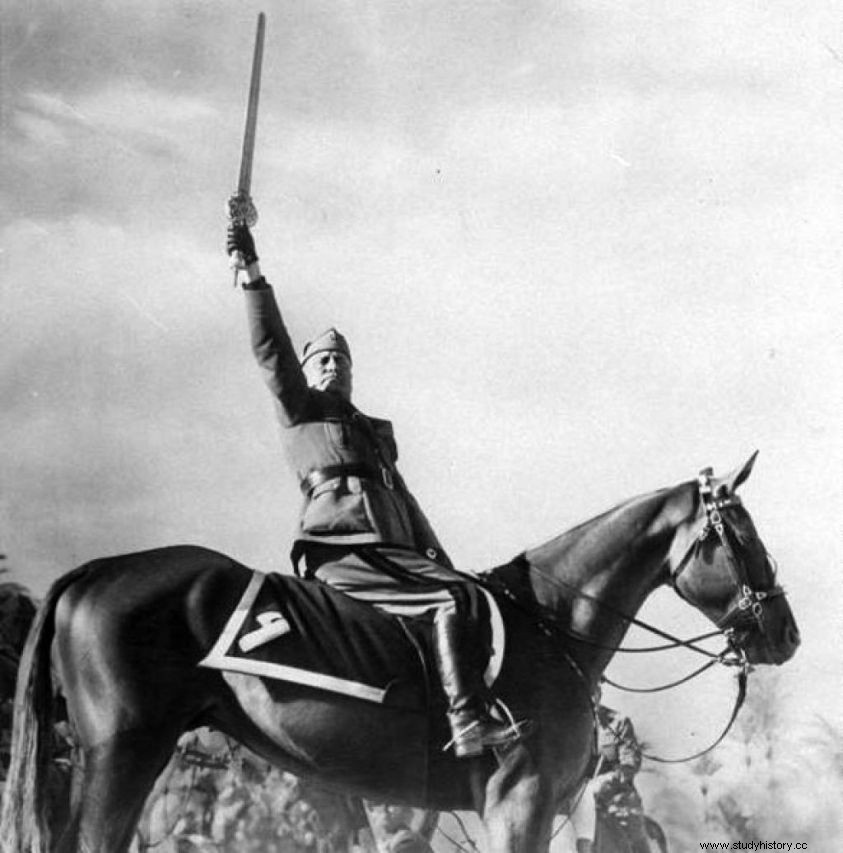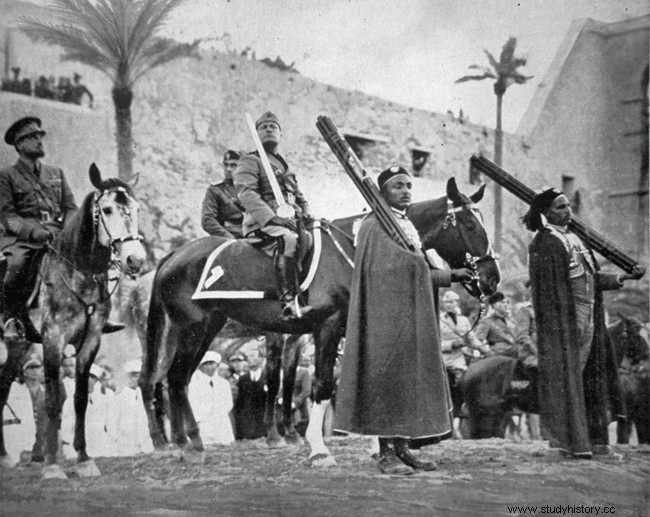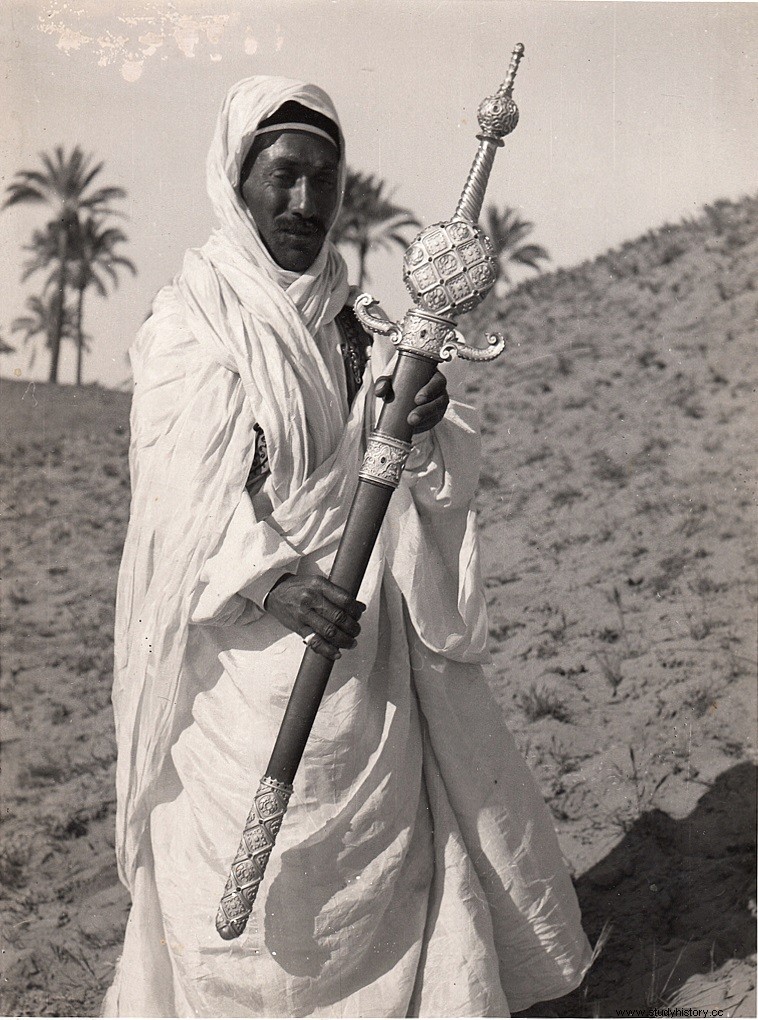
Between 1934 and 1937 Mussolini was the promoter of a policy of encouragement of the Islamic faith that would have led him to be recognized, in the Islamic world, as Protector of Islam , a recognition of great value that would have been consecrated with the delivery, by a Berber chief, of the ancient and legendary Sword of Islam .
It was March 20, 1937 when Benito Mussolini met Yusef Kerbisc near Tripoli, in Italian Libya. , a Berber leader close to the Fascist regime from whom he would have received the ancient and legendary sword of Islam as a gift, specially forged for the occasion, thus sealing the friendship between Mussolini and the Islamic people, which Mussolini undertook to protect from lay man.

This event is the culminating act of a political strategy of pacification initiated by the Duce, following the conquest of " Italian Libya "In 1934.
Mussolini did not want to be perceived as a foreign invader or conqueror, since the campaign in Libya had been told at home as a reunification campaign with Libyan cousins.
Mussolini did not want Italian Libya to be perceived, in Libya, in Italy and abroad as a Colonial territory, and, unlike the Horn of Africa, he wanted Libya to be perceived as an integral part of the Italian territory, and consequently it was the mighty propaganda machine started in 1934 which, in Libya, translated into a real policy of "encouragement" of the Islamic faith.
Mussolini knew perfectly well that faith is a powerful weapon it was a powerful weapon and that, by controlling faith, he could easily control the people, he had already experienced in Italy, with excellent results, this political line which, through the Lateran Pacts , had allowed him to get his hands on the consent of the Catholics.
Similarly to what was done in Italy, therefore, Mussolini sought the consent of Muslims and began to define local populations as "Italian Muslims of the fourth shore of Italy" , Italian Libya was the fourth shore of Italy and its inhabitants were, for the propaganda of the regime, Italians in all respects, however, unlike the Italians of the peninsula, the Italians of the fourth shore were not Christians, and therefore, for them , in “respect” of their faith, he restored the ancient war-damaged mosques and built new ones, built Koranic schools, and, in Tripoli, inaugurated the Higher School of Islamic Culture , he also established numerous assistance structures for pilgrims on their way to Mecca.
For the Libyan people, Mussolini “had done so many good things”, and even if for purely political reasons, he indirectly promoted a policy of civil and peaceful coexistence between Christians and Muslims, paving the way for the idea of a secular state in which faith is something intimate and personal and which is not it has the slightest influence on social status… or at least, on paper it was.
This political line, extremely open to the Islamic world, had reduced the resistance to the Italian domination to a minimum, and had obtained the favor of the popular masses for Mussolini, limiting the opponents to only a few exponents of the old Ottoman elite. However, Mussolini was not satisfied, and claimed for himself something more than mere consent.
Mussolini was an ambitious man, and he was tired of living in the shadow of the King who, while doing nothing, continued to be the King, continued to be the one to whom loyalty had to be sworn, continued to be the most powerful man in the Italian state , and in Libya, in 1937, we witness the first severe blow inflicted by Mussolini on the authority of the King, claiming for himself the title of successor of the caliph, which, in theory, would have belonged to the King of Italy.

Mussolini's consent in Libya was in some ways superior to what he had in Italy, however, to assume full powers and enjoy the loyalty and fidelity of the "Italian Muslims of the fourth shore" had to find a way to rebalance his spiritual position, Mussolini was still the man who had signed the Lateran Pacts, that de facto unbalanced the Italic state towards the Catholic world, and in order to restore balance to Italic spirituality, Mussolini necessarily had to find a way to bind himself to the Islamic world, without however undermining ties with the Christian world, it was therefore to be excluded a priori the “conversion to Islam “.
The solution was not long in coming, Mussolini, as early as 1934 he had claimed for himself the role of successor of the caliph, and to create that link with the Islamic world, he had to do nothing but bilaterally sanction that claim. So he did what any Italic leader would do…
He put his foot in two shoes, and as a skilled double agent he was, claiming for himself the Italic succession to the Ottoman caliph, he had himself proclaimed, by Yusef Kerbisc , a Berber leader close to the regime, Protector of Islam and to seal this appointment, he received the sword of Islam as a gift and had to swear to guarantee the Libyan people, "peace, justice, well-being and respect for the laws of the Prophet" .
E. Ertola, Land of Africa, the Italians who colonized the empire
N. Labanca, overseas. History of Italian colonial expansion
A. Randazzo, The Africa of the Duce. Fascist crimes in Africa.
A. Del Boca, From Mussolini to Gaddafi. Forty meetings.
